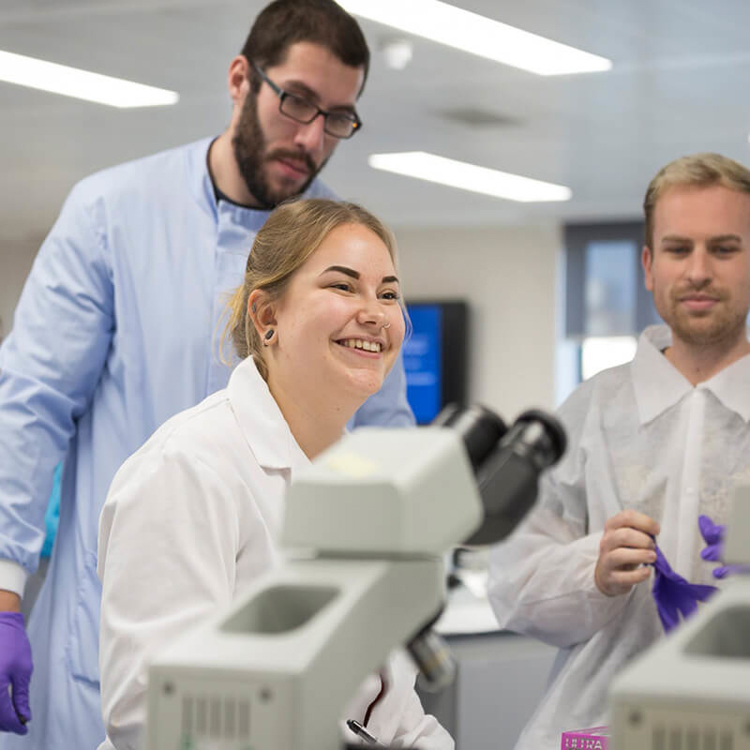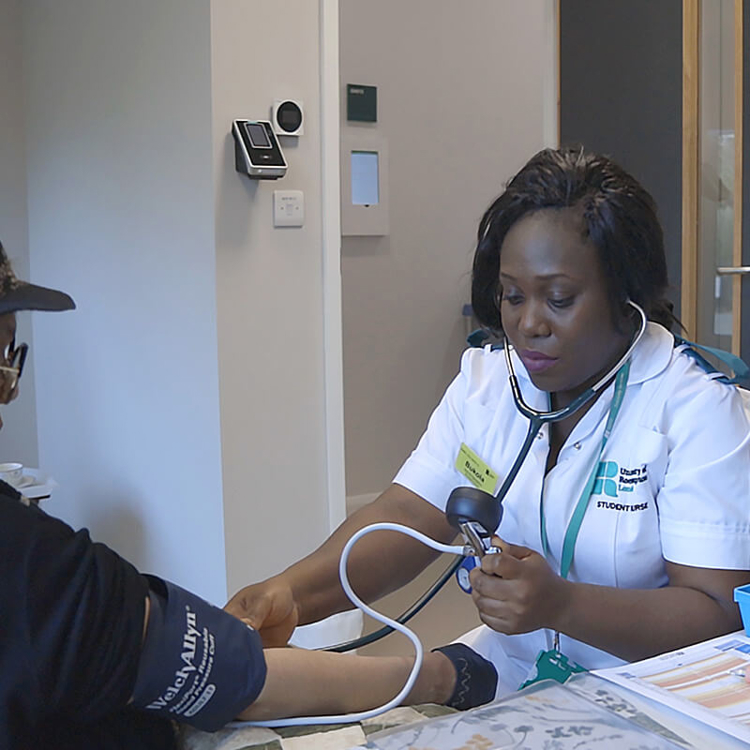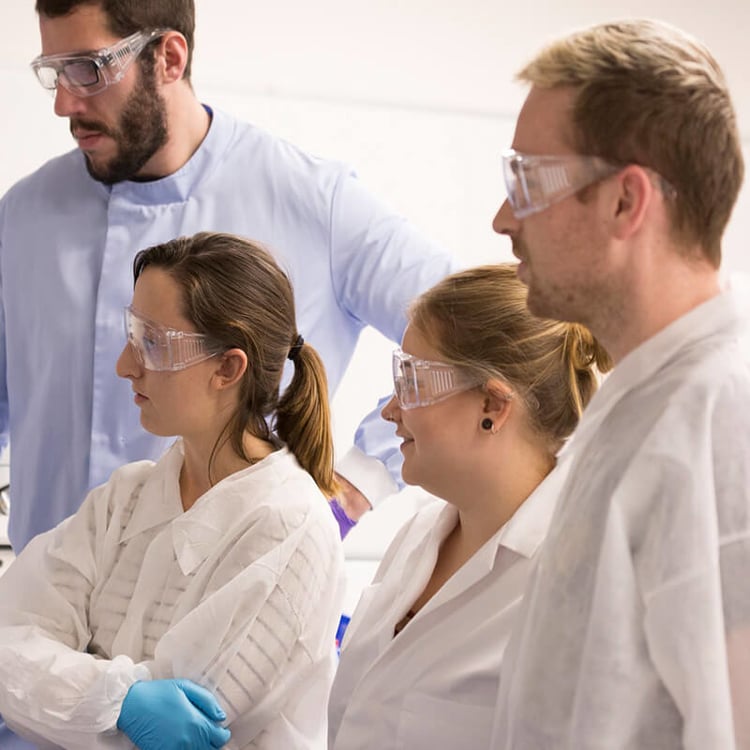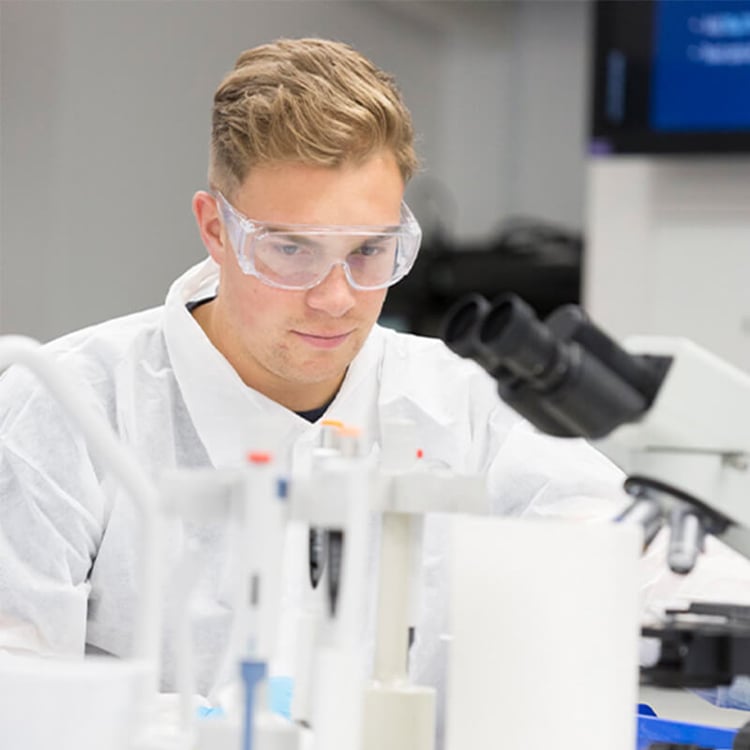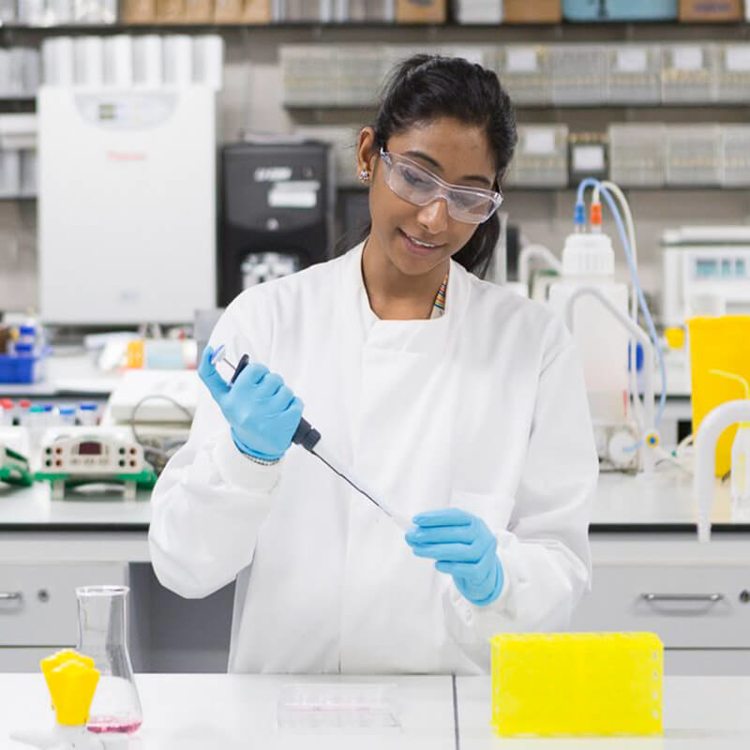Duration:
1 year (full-time)
2-4 years (part-time)
Number of Credits:
MSc: 180
PGDip: 120
PGCert: 60
Start date(s):
September 2025
January 2026
September 2026
Improving human health has never been a bigger global challenge. Get the specialist, practical skills you need to play a part in improving people’s health in the context of malnutrition, disease, and obesity.
Did you know?
Learn in state-of-the-art facilities including biomedical and microbiology laboratories.
This degree is accredited by the Association for Nutrition.

Modules
Module details: In this module, you will explore nutrients, their digestion, absorption, and functions in human physiology. Metabolic pathways and their adaptations in various physiological states will be examined. The significance of sustainable diets and novel foods in global health will be discussed. You will develop practical skills in nutritional analysis techniques, enhancing your ability to assess dietary components. This module provides a comprehensive understanding of human nutrition, equipping you with essential knowledge for addressing contemporary health challenges through diet and metabolism.
Module details: In this module, you will gain an in-depth understanding of malnutrition and recent advances in nutrition interventions for clinical conditions. Content is informed by research studies, international guidelines, and clinical practice, delivered by expert academics and practising clinicians. Case studies will reflect the multicultural world we live in, focusing on evidence-based, person-centred care. This module will enhance your ability to apply nutritional knowledge in clinical settings, preparing you to address diverse healthcare challenges with a research-driven and patient-focused approach.
Module details: In this module, you will explore obesity and related cardiometabolic diseases, examining the underlying mechanisms that govern eating behaviour from both physiological and psychological perspectives. You will consider how these mechanisms can be targeted for prevention and treatment. Additionally, you will develop communication skills to effectively engage with different audiences. This module will provide you with a comprehensive understanding of obesity-related health challenges and equip you with strategies to address them through evidence-based interventions and effective communication.
Module details: In this module, you will develop critical thinking skills to interpret healthcare research effectively and apply it in nutrition practice. You will collect body composition data using methods commonly employed in healthcare settings, conduct data analysis, and evaluate the strengths and limitations of these techniques. This module will enhance your ability to assess research critically and apply data-driven insights to nutritional practice, preparing you for evidence-based decision-making in clinical and healthcare environments.
Module details: In this module, you will collect data for three research projects, designed to develop your skills and broaden your knowledge. With lecturer-led guidance, you will engage in data collection and analysis, enhancing your research capabilities. You will select one project to present as both a scientific paper and a poster, strengthening your ability to communicate research findings effectively. This module will equip you with essential research skills, preparing you for evidence-based practice and scientific dissemination in nutrition and health.
These are the current planned modules on this course and may be subject to change.
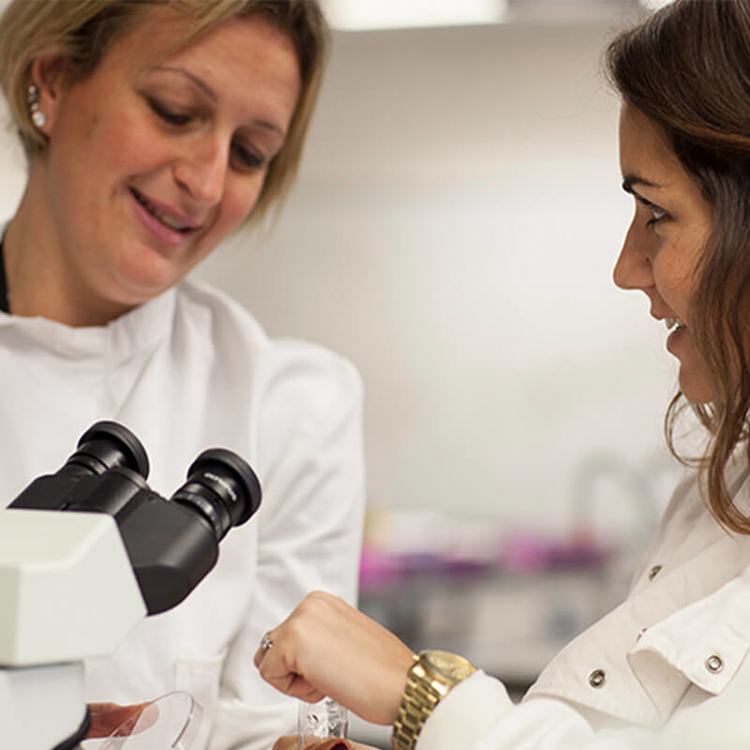
Skills
Make a difference to human lives with a postgraduate degree in Clinical Nutrition
Designed for doctors, healthcare professionals and graduates, the Roehampton master’s in clinical nutrition (MSc) will help you develop your interest in nutrition by gaining the specialist skills needed to be a global leader in your field.
Professional accreditation
This course is accredited by the Association for Nutrition since 2005.
By focusing on important insights into contemporary developments in clinical nutrition, you’ll become a confident, agile, independent thinker, with the ability to adapt rapidly to change. You’ll graduate with the knowledge and skills to:
- Understand nutritional management of malnutrition, diseases and obesity across the spectrum of ages
- Absorb complex information
- Stay up to date with the latest scientific advancement
- Develop your skills to effectively search for, and evaluate, the most recent of publications to inform your nutrition practice
- Communicate with a wide range of people from scientists to healthcare professionals, patients and general public
This was the first MSc in Clinical Nutrition to be established in the UK and has gained an international reputation, attracting students from around the world. You will consider the patient’s journey from birth to extreme age in the context of the metabolic response to injury or to chronic disease.
Please note this programme does not lead to a qualification in the UK as a registered Dietitian. It is an accredited course with the Association for Nutrition, and does enable you to become a registered nutritionist, once you have complete two years in the nutrition field.
After establishing a firm foundation in physiology and the biochemistry of nutrition, this programme will cover the nutritional management for clinical conditions such as gastro-enteral problems, long-term disablement, and intensive care. It also includes a focus on nutrition support in paediatric, adult, older adult and critically ill patients.
This course is perfect for nutrition support teams or those who want to pursue a career or a doctorate in clinically based nutrition. The course will provide an important insight into contemporary developments in clinical nutrition for a wide range of healthcare professionals.
Learning
Learn in a stimulating environment.
Created in collaboration with industry-leading professionals, the Roehampton Clinical Nutrition includes important insights into contemporary developments, for a wide range of healthcare professionals.
Working in high-spec facilities, like our state-of-the-art facilities and excellent laboratories including a food lab with sensory analysis tasting booths and specialist laboratories for physiology, microbiology, and computing.
You’ll shape your studies around your own interests and aspirations, including topics such as:
- Macronutrient and micronutrient metabolism
- Nutrient digestion, absorption, and gastrointestinal disease
- Nutritional support in paediatric, adult, older adult, and terminally ill patients
- The effect of disease on nutrition status
You’ll shape your studies around your own interests and aspirations, with optional modules including:
- Cells, Disease and Therapy
- Obesity and Metabolism
- Health Psychophysiology
The School of Life and Health Sciences is a progressive and inclusive community, putting you at the centre of your learning journey. Recognising that our students have different personal circumstances, we limit on-campus teaching to a maximum of two days per week, enabling you to balance your studies with work, family, and other external commitments.
You will get the chance to explore interesting topics including:
- Living gluten free with coeliac disease
- Dietary management strategies in women with polycystic ovary syndrome
- The role of brain–gut interaction in obesity
- Irritable bowel syndrome
- The role of the enteric nervous system in known intestinal diseases
- The role of microbiota in food and nutritional systems
- Food bioactives for a healthy gut
- Brain and vascular system
- The regulation of insulin secretion
- Glucose metabolism in health and diabetes.
For an overview of the research carries out by our academics within the School of Life and Health Sciences, please visit the departmental research pages.

Assessment
Push yourself further with real-world assignments.
Throughout the course, you’ll be set authentic assessments, meaning that your projects, tasks and exercises will replicate the working world of clinical nutrition, ensuring that you are fully prepared for life after graduation.
You’ll leave Roehampton with an in-depth understanding of both the theory and the hands-on applications of clinical nutrition, ready to take the next step.
You’ll be set authentic assessment, meaning that your projects, tasks and exercises will replicate the working world of clinical nutrition, ensuring that you are fully prepared for life after graduation.
Careers
With a Roehampton Clinical Nutrition masters, you can go onto a wide range of careers.
This includes:
- Nutritionist (public sector, private commercial or independent)
- Public health nutritionist
- Academia research/teaching
- Commercial research
- NHS (various roles)
- Local and central government (roles in policy and health promotion)
In addition, many students are already health professionals and study the course as part of their career development and specialisation.
Find out more about becoming a Nutritionist.
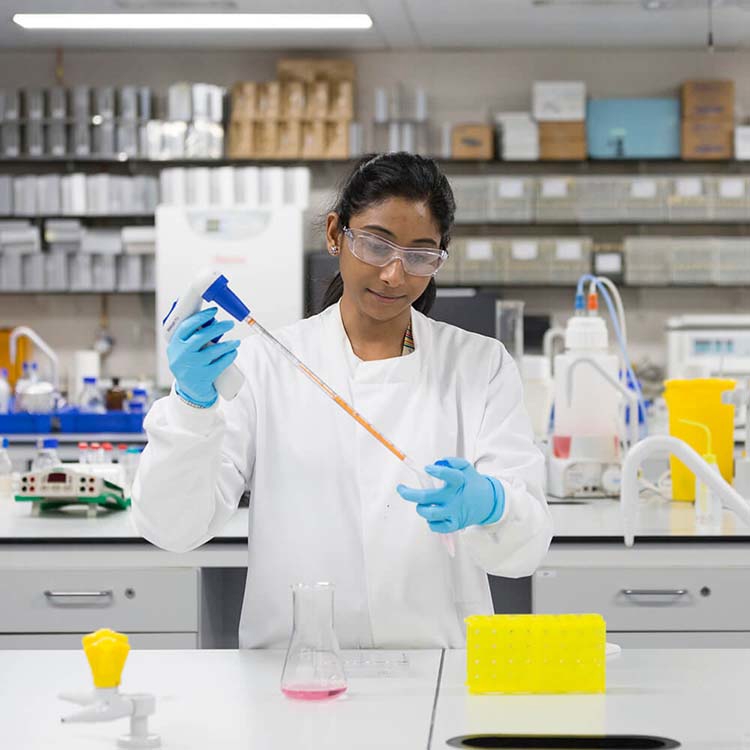
Our careers team is available to support you from the start of your studies until after you graduate. We will help you build your CV, prepare for interviews, and meet and learn from successful graduates working at the top of their careers. You’ll also have opportunities to work with our partners across London and beyond, and to attend a Roehampton jobs fair where you can find out about graduate opportunities and meet employers.
Open days
Get a real taste of our campus, community and what it’s like to study at Roehampton
Applying
UK postgraduate students apply through our direct application system.
Specific entry requirements
Entry on to this course requires an undergraduate degree in a related discipline. If you are unsure if your degree qualifies please contact us.
General entry requirements
September 2025 entry tuition fees (UK)
| Level of study | Full-time | Part-time* |
| MSc | £11,250 Professional Experience Year: £2,500 |
£5,625 |
| PGDip | £7,500 | £3,750 |
| PGCert | £3,750 | £1,875 |
*Year 1 fee
We offer a wide range of scholarships and bursaries. See our financial support pages for UK students.
We also provide other ways to support the cost of living, including free buses and on-campus car parking, hardship support and some of the most affordable student accommodation and catering in London. Find out more about how we can support you.
International postgraduate students apply through our direct application system.
Specific entry requirements
Entry on to this course requires an undergraduate degree in a related discipline. If you are unsure if your degree qualifies please contact us.
General entry requirements
September 2025 entry tuition fees (international)
| Level of study | Full-time | Part-time* |
| MSc | £18,250 Professional Experience Year: £2,500 |
£9,125 |
| PGDip | £12,170 | £6,085 |
| PGCert | £6,085 | £3,045 |
*Year 1 fee
We offer a wide range of scholarships and bursaries. See our financial support pages for international students.
We also provide other ways to support the cost of living, including free buses and on-campus car parking, hardship support and some of the most affordable student accommodation and catering in London. Find out more about how we can support you.


